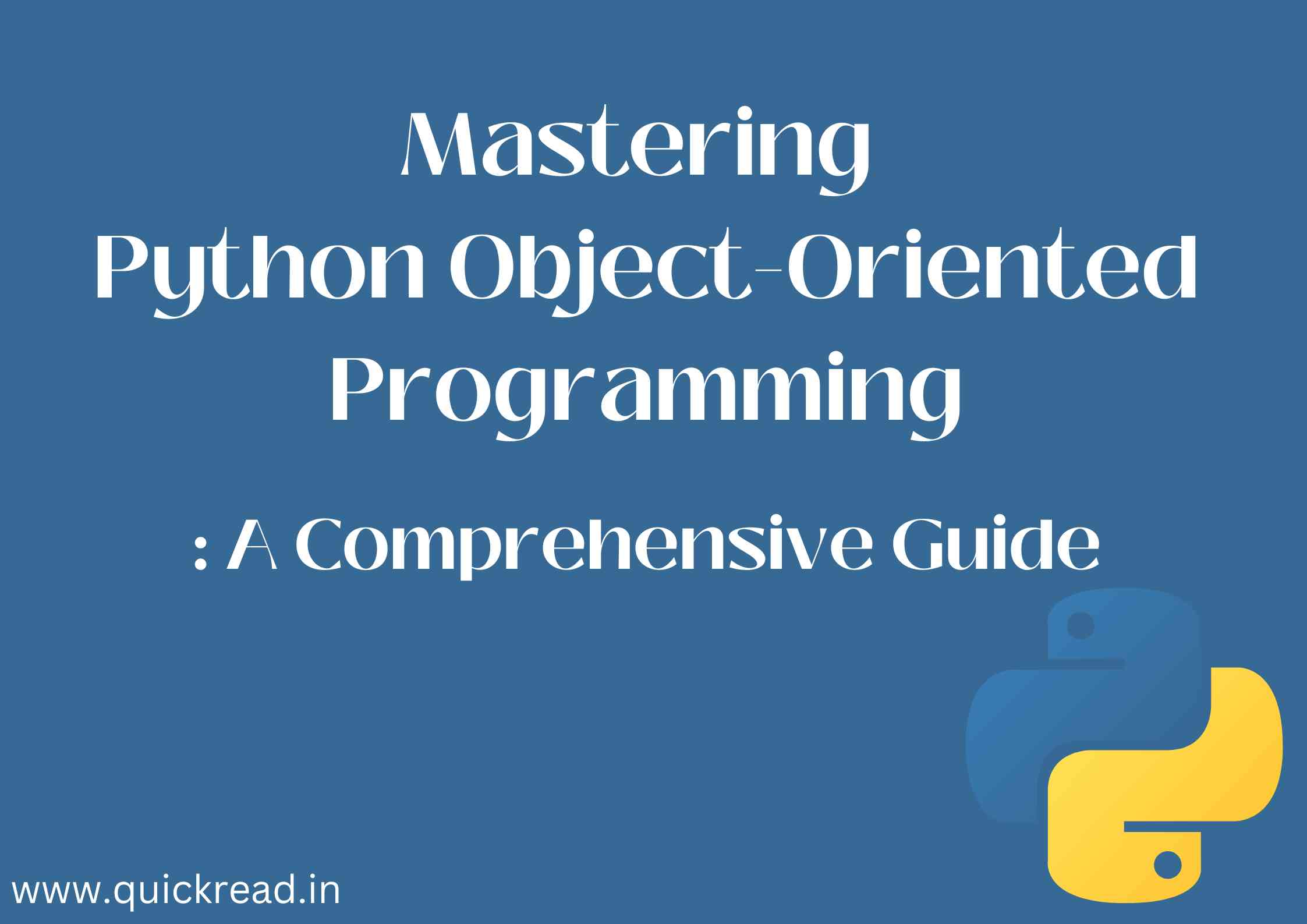Last updated on September 16th, 2023
Introduction Python Object-Oriented Programming
Python is an object-oriented programming language that provides a clear and concise way to create modular and reusable code. The key principles of object-oriented programming in Python are:
Classes and Objects in Python
- A class is like a blueprint for creating objects. It defines attributes and behaviors.
- An object is an instance of a class. It inherits all the attributes and behaviors defined in the class.
Encapsulation in Python
- Encapsulation refers to binding data and functions within a class.
- It prevents external access to an object’s internal data and controls how the data is accessed via methods.
Example of Encapsulation
class Person:
def __init__(self, name, age):
self.name = name
self.age = age
def greeting(self):
print(f"Hello, my name is {self.name} and I am {self.age} years old.")
person = Person("John", 30)
person.greeting()Inheritance in Python
- Inheritance allows a new class to be based on an existing class, inheriting its attributes and behaviors.
- The new child class can override or extend the attributes and behaviors of the parent class.
Example of Inheritance
class Vehicle:
def __init__(self, make, model, fuel="Gas"):
self.make = make
self.model = model
self.fuel = fuel
class Car(Vehicle):
def __init__(self, make, model, fuel="Gas", doors=4):
super().__init__(make, model, fuel)
self.doors = doors
my_car = Car("Toyota", "Prius", doors=2)
print(my_car.make, my_car.doors)Polymorphism in Python
- Polymorphism allows different class objects to be treated as if they were the same class.
- The same method call can produce different results depending on the object it is acting on.
Example of Polymorphism
class Animal:
def make_sound(self):
print("Generic animal sound")
class Dog(Animal):
def make_sound(self):
print("Woof woof!")
class Cat(Animal):
def make_sound(self):
print("Meow")
dog = Dog()
cat = Cat()
dog.make_sound() #Output: Woof woof!
cat.make_sound() #Output: MeowAbstraction in Python
- Abstraction refers to exposing only essential information and hiding implementation details.
- Abstract classes define an interface and leave the implementation to child classes.
Example of Abstraction
from abc import ABC, abstractmethod
class Shape(ABC):
@abstractmethod
def area(self):
pass
class Rectangle(Shape):
def __init__(self, width, height):
self.width = width
self.height = height
def area(self):
return self.width * self.height
r = Rectangle(3, 4)
print(r.area())OOP Principles Summary
| Principle | Description |
|---|---|
| Encapsulation | Binding data and functions within a class |
| Inheritance | Child classes inherit attributes and behaviors of parent classes |
| Polymorphism | Same method call produces different results based on object |
| Abstraction | Exposing essential information and hiding implementation details |
These principles make object-oriented code:
- Modular – can be broken into multiple standalone, reusable pieces
- Reusable – objects can be reused across applications
- Extensible – can easily be extended to add new features
- Maintainable – easy to update and change
In Python, everything is an object which allows for building robust and effective object-oriented programs. Classes and objects are fundamental building blocks. Encapsulation, inheritance, polymorphism and abstraction help structure the code into a flexible and organized form.
Conclusion
Python’s object-oriented programming features make it easy to build complex applications by bundling code into reusable classes. Following key principles like encapsulation, inheritance, polymorphism and abstraction results in robust, modular and well-organized code. OOP allows developers to think at a higher level of abstraction and helps manage complexity. With the power of OOP, Python is an excellent language for building large real-world applications.
Frequently Asked Questions
What is the benefit of encapsulation in OOP?
Encapsulation improves flexibility and reusability as class internals are protected from unintended access. It allows changing implementation details without affecting other code.
How is polymorphism useful in programming?
Polymorphism allows the same code to be reused for objects of different classes. New classes can be introduced without changing existing code, improving extensibility.
When should you use inheritance in OOP?
Inheritance should be used when there is an “is-a” relationship between classes, meaning the child class is a more specific type of the parent class. This allows reusing common logic in the parent.
What does abstraction mean in programming?
Abstraction focuses on the essential features of an object and helps segregate its functionalities into interchangeable modules. This enables working with complex systems in a simplified manner.


